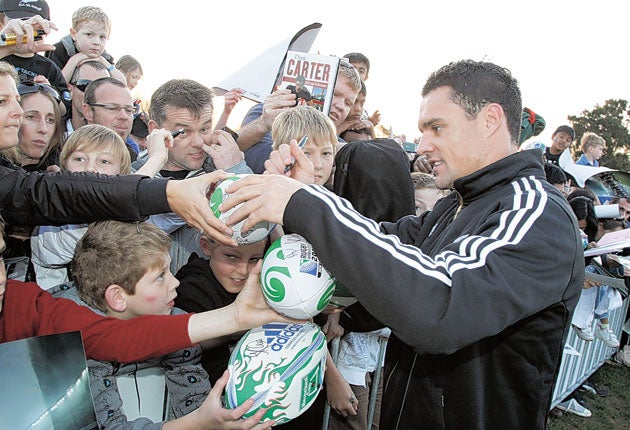James Lawton: Why a piece of me wants an All Black win

It may be a little early in the day, and some might also worry about a hint of treachery, but no apologies here this morning for raising a glass of the fine Sauvignon Blanc of Marlborough to both the meaning and the hopes of New Zealand rugby. The hard-hitting Tongans are likely to be dispatched in some style and, after all, the exquisite Audrey Hepburn did once declare, "It's 5pm somewhere in the world, darling." Certainly some small English gesture might be welcome at this dawn of the seventh rugby union World Cup – and so soon after the gross impertinence of our borrowing the All Black uniform as a second strip. As inappropriateness goes, that was surely up there beyond the borders of sacrilege.
No doubt someone is already aching to point out that with one win apiece, New Zealand and England stand equal in the roll call of World Cup winners – and, yes, it is also true that the team Martin Johnson sends out against Argentina tomorrow has inherited a formidable tradition of achievement after the triumph in Sydney eight years ago and an unlikely runners-up finish in Paris in 2007.
But then however England perform over the next few weeks there is surely a compelling case to say that if they cannot turn back the tides of probability on a third straight occasion, an All Black success would bring an exhilaration all of its own.
It would, within the parameters of sport, even up the ledger somewhat, give excellence and consistent striving its day in all the years of sore disappointment and sometimes unfathomable under-achievement that stretch back through every World Cup except their first and only victory in the inaugural tournament on home soil in 1987.
It would also bring, it is maybe not too fanciful to imagine when you remember quite how deeply the average New Zealander, one of just four million of them of course, identifies with the prowess of their rugby team, a degree of aid and comfort to that embattled stretch of country that used to run with such implacable certainty from the now earth-quake-ravaged Christchurch into the plains of Canterbury.
Indeed, if Richie McCaw's team announce themselves winners in Auckland next month there should be little difficulty in picking out arguably the epicentre of New Zealand celebration. It is likely to be the small town of Southbridge, birthplace of the world's most gifted rugby player, Dan Carter.
Southbridge, 28 miles south west of Christchurch, is like so many small towns in New Zealand. It has 721 people, 260 houses and nine rugby teams. The rugby club was established in 1871 and for most of the time since has been announcing itself as an archetypal foundation of the New Zealand passion for the oval ball. Carter was not their first All Black when he burst into international recognition eight years ago but the shirt he handed to the club after a dramatic debut against Wales is understandably occupying pride of place on its honours board.
When Carter had still to accumulate a quarter of his current total of 82 Test caps, he was already being embraced as something more than a phenomenally talented out-half.
He was, the reigning club president announced while opening up the clubhouse on a winter afternoon of brilliant sunshine, someone who had restored the roots of New Zealand rugby, returned it to a past where the line of succession was unthreatened by a drift away from the countryside and, still less, the impact of an earthquake that would cast long-term doubts about the workability of the land which in everyone's living memory had been covered in wheat and landmarked by a church, a war memorial and a rugby field.
Chris McKinnon declared, "Go into every little town in the country and they will tell you that Danny Carter has given us the most precious thing apart from identity and pride and belief in our past, which we know in rugby has been great, but also the future. He has given us hope that we can re-make past greatness." There was every reason for such encouragement in 2005, when the emerging Carter cut the British and Irish Lions into so many pieces one night in Wellington and the future had never seemed less wired for ambush. Unfortunately another one occurred at the 2007 World Cup despite the pace and ingenuity of Carter.
This means that this morning the rugby world once again examines the possibility that the All Blacks are once again merely temporary favourites in the game that has dictated the nation's heart-beat for so long. The sense here, though, is one easily shared with Southbridge. It says it is time to lift not only the shining glass but also the heart of a great sports nation.
Join our commenting forum
Join thought-provoking conversations, follow other Independent readers and see their replies
Comments
Bookmark popover
Removed from bookmarks